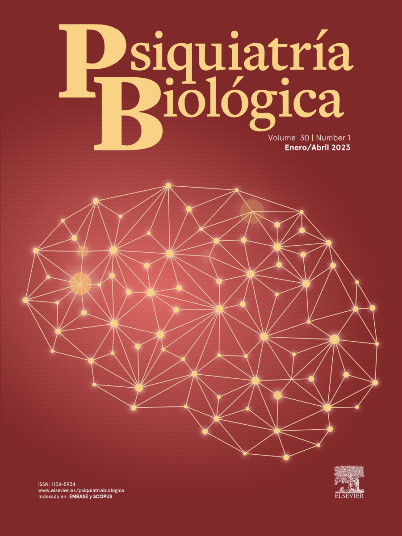Con el presente artículo se pretende hacer una revisión mediante la exposición de un caso clínico de la clínica, el diagnóstico y el tratamiento de la manía confusa.
Caso clínicoMujer de 36 años diagnosticada de trastorno bipolar tipo I que ingresa en psiquiatría por presentar un cuadro brusco consistente en irritabilidad, inquietud, expansividad, alteraciones conductuales y discurso incoherente. Durante el ingreso se objetiva deterioro en la atención, orientación y memoria, confusión, fluctuación del comportamiento y pensamiento, y alteraciones en la psicomotricidad.
ResultadosLa manía confusa se presenta de forma abrupta con sintomatología maniforme, psicótica y confusional, pudiendo complicarse con clínica catatoniforme. Se deben descartar causas orgánicas del cuadro y realizar diagnóstico diferencial con otros síndromes neuropsiquiátricos. El tratamiento de primera línea consiste en benzodiacepinas y TEC.
ConclusionesReconocer este cuadro clínico es relevante para instaurar tratamiento precoz y evitar las complicaciones derivadas, así como la morbimortalidad.
The objective of this article is to review, through the presentation of a case report, the symptoms, diagnosis and treatment of delirious mania.
Case reportWe present a 36-year-old woman diagnosed with bipolar I disorder who was admitted to psychiatry ward for presenting an abrupt episode consisting of irritability, restlessness, expansiveness, behavioral disturbances and incoherent speech. During admission, the patient was observed to have a global worsening consisting of deterioration in attention, orientation and memory, confusion, fluctuation of the symptoms and alterations in psychomotor skills.
ResultsDelirious mania presents abruptly with manifest, psychotic and confusional symptoms, and can be complicated by catatoniform symptoms. Organic causes of the condition should be ruled out as well as a performing a differential diagnosis with other neuropsychiatric syndromes. First-line treatment consists of benzodiazepines and ECT.
ConclusionsRecognizing delirious mania is relevant to establish early treatment and avoid derived complications, morbidity and mortality.









